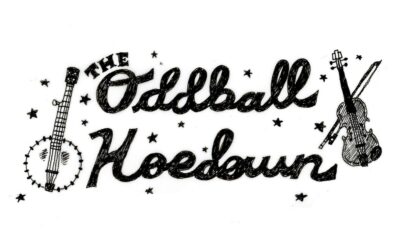I kept seeing “Annie Oakley” written on flyers and newspapers, advertising a band making its way around the Oklahoma folk/Americana music circuit. I kept hearing their name from friends, some even less hip and more out of touch than me, who were fans.
At the same time, I kept noticing twin sisters, locked in step, around the little Oklahoma City college where I work. But it was still about a year before I put it all together, finally seeing a picture of them with their guitars in the newspaper. I realized that the Babb sisters, not yet old enough to even buy a drink in the bars where they play, were the Oklahoma-famous Annie Oakley band.
I was struck to discover such old souls, quick wit and devastatingly good players within these young women. Grace and Sophia Babb, at only 19-years-old, possess a level of maturity and determination that I, at my decrepit, jaded old age, can only strive towards.
Annie Oakley released their first, self-titled album in 2013, when the twins were 16 years old. A duo of singers and guitar pickers, the Babbs have teamed up with their friend and astounding violinist, Nia Personette. Together, they contribute to an ongoing folk revival in the heart of Oklahoma.
Sometimes their melodies feel familiar, like the songs have been a part of Americana for a hundred years. Other times, the melodies are so unique and intricate that I find myself fixating on the melody more than anything else. For instance,
“Dangerous Mind” wanders into a set of melodies unlike anyone else’s, almost psychedelic in its meandering tones yet grounded by arpeggiated chords and perfect harmonies. Or there’s “Hunter’s Moon,” a jam that creeps over one’s brain like mellow whiskey, at points almost threatening to bust out into a dance that’s downright rowdy.
Then, there are the live shows, of which there are plenty. When the Babb sisters play, they showcase proof of that psychic link between twins. Their performance is so flawless that it’s as if the guitars themselves premonice what the other will do next. The majority of acts that play the same stages as Annie Oakley tend to convey a sort of underdog sense of hope. Generally, a band around here might be a group of musicians with some talent who are working to achieve some level of mastery. Sure, there’s joy to be had in witnessing this process, and I can delight in seeing these types of bands all day. But when Annie Oakley takes the stage and launches into a song, it sounds as if they were born and raised within that level of mastery others strive for. Even so, they continue to perform live in the Oklahoma City/Norman area every weekend that they’re not playing in Kansas, Colorado, Texas or wherever else the music takes them.
Now, they have a new EP to be released in February. Even with such a rigorous touring schedule, Annie Oakley is writing new songs constantly, almost aggressively. That enthusiasm towards progress, even after the dues they’ve already paid, says a lot about the pair.
And so does their songwriting. Unique among the folk music of the area, the lyrics of Annie Oakley songs often deliver social commentary and, at times, downright protest. In “Our Red Earth,” Annie Oakley digs into the story of Daniel Holtzclaw, an Oklahoma City Police Officer found guilty in 2015 of raping thirteen women on his police beat. The duo sings, Thirteen women / until he stood and cried behind a stand / Oh he cried — once — for the TV screen / Thirteen women / Their tears went unbelieved. Despite the intensity of the lyrics, the accompanying music is as soothing as the warmth of a crackling fire or the scent of honeysuckle on the spring air before a steady rain.
Their songs welcome hard discussions that can sometimes put them at odds with the Okie-from-Muskogee types that tend to populate the landscape in which they perform. At festivals, Annie Oakley is sometimes on the receiving end of mean-mugging, and there’s the occasional dude in a trucker hat who dramatically grimaces and stomps his way out. Other folky acts in the area sing mostly about leaves, trains, and girls–depressingly apolitical stuff. So, I appreciate Annie Oakley’s honesty. They’re confronting the world’s ugliness with some of the most beautiful harmonies I’ve ever heard.



